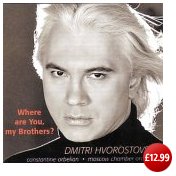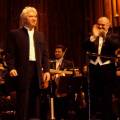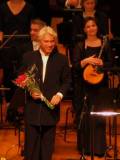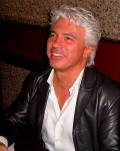I made a last minute decision to go and see him in concert at The Barbican. The programme is in the extended entry, although one of the pieces on the second half was replaced by a Katchachurian orchestral piece.
It was slightly odd having the first half of operatic arias and other classical pieces, and the second half Soviet war songs, but I enjoyed it more than I thought that I might.
The first half was pretty much unfamiliar to me, except for the Prince Igor, and even then it was the accompanying music rather than the aria that I know so well. And the second half was entirely unfamiliar. He used a microphone for the second half, although the amplification was not intrusive. The lighting was altered so that the orchestra and chorus were semi-lit and he shimmered in a relatively lighter spot. I wish he had used a period microphone, because he addressed the modern microphone in a style reminiscent of a 1940s crooner, down to the elegance of his stance and his body-language.
I am not a massive fan of Dima, respecting him rather than liking him. Other people were explaining to me that he is a lyric baritone, but I hear a voice that is quite gruff in the lower end of the range, and a lot of the colouring seemed (to me) at the lower end, towards the basso end where I start to find it quite difficult to hear music. That having been said, in one of the songs from the Great Patriotic War I had a momentary surprise that he didn't take it right up to the high C, then I remembered that he isn't a tenor. So I guess he must be a lyric baritone. It's a beautiful voice and superbly executed but it affects me on a cerebral rather than an emotional level.
I enjoyed the first half, a reminder that I have largely neglected Russian music of late. Which is silly, because Tchaikowsky is wonderful, and I really liked the Rubinstein arias, especially the Epitalama Vindex "Poju tebe Bog Gimeneja" from Nero.
 I adored the second half. For some reason I had expected the songs to be turgid settings of unimaginative Soviet propaganda.The translations were projected on the surtitle screen And I found the words rather uplifting and at times moving. Frenkel's 'Zhuravli' Cranes was beautiful and Nozhkin's 'Posledniy Boi' The Last Battle brought tears to my eyes. I'm tempted to buy the CD. Perhaps I should have bought it last night and got him to sign it. Ah well...
I adored the second half. For some reason I had expected the songs to be turgid settings of unimaginative Soviet propaganda.The translations were projected on the surtitle screen And I found the words rather uplifting and at times moving. Frenkel's 'Zhuravli' Cranes was beautiful and Nozhkin's 'Posledniy Boi' The Last Battle brought tears to my eyes. I'm tempted to buy the CD. Perhaps I should have bought it last night and got him to sign it. Ah well...
What surprised me was how the songs inhabited the same sound world as many Western pop songs of the same era, think Casablanca, or I certainly did. One of my companions used the word 'evocative', which was spot-on.
In the interval, the One-Woman-Crusade-Against-Cr***o**r had expressed some dread at the thought of an entire half of cr***o**r, but I got quite animated in saying that folk isn't crossover. I did wonder whether it would class as 'World Music', then it struck me that World Music is other people's Folk. I don't know whether they are properly folk; I guess the litmus test would be whether they rose from the ordinary soldiers or whether they were commissioned by the Stalinist Propaganda Machine.
He was quite the Mr Haughty-Russkie in the first half, but he seemed to relax in the second half and appeared to be enjoying himself.
And afterwards he did a signing session, so we went baritone-stalking...
Rimsky Korsakov Procession of the Nobles from Mlada with Chorus
Rachmaninov Alekos Aria from Aleko
Tchaikovsky Polonaise from Eugene Onegin
Rubenstein 'Ne plach ditja' from The Demon
Rubenstein 'Na vozdushnom oceane' from The Demon
Mussorgsky Dawn on the Moscow River, Prelude to Khovanschina
Borodin Prince Igors aria 'Ne sna ne Otdikha' from Prince Igor
Tchaikovsky Dance of the Skomorokhs from The Snowmaiden
Rubenstein Epitalama Vindex "Poju tebe Bog Gimeneja" from Nero
Molchanov 'Vot soldaty idut' The Soldiers are coming with choir
Bogoslovsky 'Temnaja noch' Dark is the Night
Basner 'Na bezymjannoj vysote' On a Nameless Hill
Shostakovich Waltz from the film the First Eschelon
Molchanov 'Zhdi menya' Wait for me
Novikov 'Dorogyi' The Roads
Tariverdiev 'Gde to daleko' Somewhere far away
Blanter Kovalenkov The Sun hides behind the Hills
Fradkin 'Slutchaynyy Vals' Unexpected Waltz
Frenkel 'Zhuravli' Cranes
Nozhkin 'Posledniy Boi' The Last Battle
Philharmonia of Russia
Constantine Orbelian conductor
Dmitri Hvorostovsky baritone
The Yale Alumni Chorus





